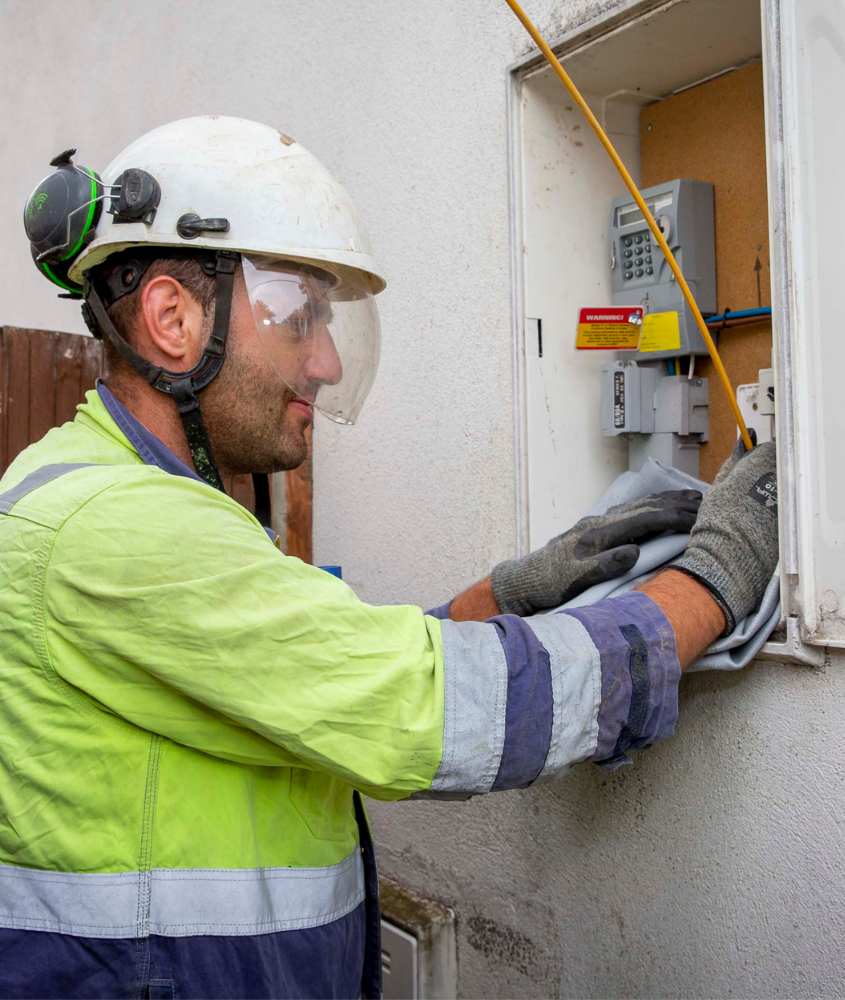
We are living in a digital era, where anyone can run a business, work, and play online. With great advancements in software, hardware, and broadband enabling us to be more connected than ever, it is also more important to protect ourselves online.
Cybersecurity is a critical function of any business’ operations. It is defined as “the state of being protected against the criminal or unauthorised use of electronic data, or the measures taken to achieve this.”
During the first wave of the pandemic, Ireland became acutely aware of the significance of cybersecurity and what can occur when there is a breach in an organisation’s network. In May 2020, the HSE (Health Service Executive) fell victim to what is now known as one of the largest ransomware attacks in the history of the Irish state. Critical services were forced offline and large volumes of personal data were breached.
“The three pillars of cybersecurity are: protection, detection, and response. Protecting the network, detecting the breach, and responding to the breach in a timely matter.”
Ransomware attacks are a class of malicious software that prevents the end-user from accessing a system or data. Attackers typically request a payment, often in the form of bitcoins, to decrypt files or restore access. These types of attacks can be triggered by clicking on “phishing” links or opening an infected attachment in an email.
These types of attacks are becoming more common in small and medium businesses. In fact,
90% of Irish businesses over the last two years have seen a rise in cybersecurity attacks, according to a report from EY Global Information Security Survey in 2021.
Meanwhile, new research conducted by
PwC indicates a focus on financial cybercrime and fraud. In its report, PwC states that 70% of the organisations that experienced new incidents of fraud said it was as a result of Covid-19 disruptions.
Cybersecurity attacks are becoming increasingly more sophisticated, with hackers using timed emails and texts to target employees accounts, and in many cases replicating emails to appear legitimate to trick employees. How a business prepares their network and employees is how they protect themselves.
So how can a business protect themselves? The three pillars of cybersecurity are:
protection, detection, and response. Protecting the network, detecting the breach, and responding to the breach in a timely matter. The stronger the network, the more protected your business can be.
Fibre connectivity is one of the most secure network connections a business can have. Fibre enables you to reach speeds exceeding a gigabit, which can help protect you against attacks. The faster your upload speed, the faster your business can react to a threat, and shut it out.
As well as that, fibre broadband has a faster upload throughput, allowing for a business to control their environment, and act on problems within its network faster.
“If security is one of your concerns, fibre beats copper in every way. Fibre is much more secure and less easy to tap into than a standard copper cable”
With gigabit download speeds, patches and updates are installed faster, securing your business’s software, and allowing you to notice cloud issues in a timely fashion.
Comparing to outdated copper connections, which have a lower latency and speed rate, your business is safer with a fibre connection, as the slower your connection, the slower your response time.
With SIRO’s fibre-to-the-premises, gigabit connection, you have a dedicated line into your business’s premises. Not only does this guarantee reliable speed, but it provides security from cyber-crime too.
This is because hackers can only penetrate your connection by physically cutting the cables, which causes the signal to disappear, making it impossible for the intruder to access any confidential information and data. When the signal disappears, you are alerted, enabling you to act on time in case of any eventuality.

If security is one of your concerns, fibre beats copper in every way. Fibre is much more secure and less easy to tap into than a standard copper cable. As fibre cables do not need to be grounded in the same way that copper cables do, it means that there is much less chance for other digital interferences or bugging/tapping concerns.
Fibre networks also enable you to put all your electronics and hardware in one secure central location, instead of having wiring closets with equipment throughout the building.
Therefore, the confidentiality, integrity, and availability (CIA) of your data is vastly improved.
Data is now one of our most valuable commodities. Protecting your customers and employee’s data should be a key driver in strengthening your business’s network.
As businesses become more tech-savvy and integrate digital services, like Customer Relationship Management (CRM) tools, into their daily practices, on the flip side, hackers and phishers are also becoming more sophisticated in targeting SMEs. According to
CWSI, an international workplace security and compliance specialist phishing is perceived to be the highest cybersecurity threat in Ireland (76%), followed by human error (58%) and ransomware (46%).
Pleading ignorance is no longer credible. This makes keeping up to date on the latest cybersecurity trends to safeguard your practices essential. While any cyberattack or hack of a business brings with it huge costs, financial loss, down time and enormous amounts of disruption, the most significant and often most incalculable effect can be long-lasting reputation damage to your business.
At SIRO, we believe that connectivity matters. Yet, protecting the huge benefits of living and working online must be a proactive, rather than a passive, exercise. With a solid foundation to your network, through SIRO’s business and enterprise products, you can be guaranteed a reliable, resilient and safer connection.
To find out if your business can avail of SIRO for Business, search your business eircode today.
Search Your Eircode Today
 Multi-gigabit speeds can provide:
Multi-gigabit speeds can provide:
 Commenting on the launch of its 10 Gigabit-enabled network for Galway City, SIRO CEO John Keaney stated: “Galway has long been a city which embraces technology, quickly leveraging innovation to drive economic growth and job creation. This has positioned Galway to successfully attract significant foreign direct investment and for its start-up businesses to compete globally. SIRO also has innovation in its DNA. As Ireland’s first 100% fibre network, operating as a broadband wholesaler driving greater competition and choice, moving up a gear to roll-out multi-gigabit speeds up to 10 Gigabit for enterprise, just makes sense. Higher speeds, increased bandwidth and much lower latency meets a growing business demand. More importantly, for us it’s about developing and deploying world-class connectivity infrastructure to support enterprise needs for years to come.
“With speeds of up to 10 Gigabits, Galway enterprise level companies can develop and use products and services of the future, today. Access to this level of bandwidth will also give Galway city a unique competitive advantage in a global marketplace,” added Mr. Keaney.
Search your business eircode today to see if you can Do Business Different
Commenting on the launch of its 10 Gigabit-enabled network for Galway City, SIRO CEO John Keaney stated: “Galway has long been a city which embraces technology, quickly leveraging innovation to drive economic growth and job creation. This has positioned Galway to successfully attract significant foreign direct investment and for its start-up businesses to compete globally. SIRO also has innovation in its DNA. As Ireland’s first 100% fibre network, operating as a broadband wholesaler driving greater competition and choice, moving up a gear to roll-out multi-gigabit speeds up to 10 Gigabit for enterprise, just makes sense. Higher speeds, increased bandwidth and much lower latency meets a growing business demand. More importantly, for us it’s about developing and deploying world-class connectivity infrastructure to support enterprise needs for years to come.
“With speeds of up to 10 Gigabits, Galway enterprise level companies can develop and use products and services of the future, today. Access to this level of bandwidth will also give Galway city a unique competitive advantage in a global marketplace,” added Mr. Keaney.
Search your business eircode today to see if you can Do Business Different

 Enterprise Ireland is the State Agency responsible for supporting exporting Irish-owned companies. We support start-ups from initial ideation stage in many settings, whether entrepreneurship training, third level institutions, start-up hubs or others. We are also an investor in many Irish funds offering seed and venture capital to companies and are a large direct equity investor in our own right.
Our offer for established companies includes direct financial support and advice for expansion, investment, productivity improvement and innovation. We also provide advice and guidance for companies through dedicated Development Advisors on our team. Enterprise Ireland has 40 offices all around the world focused on market access and support for companies to grow and expand internationally
Enterprise Ireland is the State Agency responsible for supporting exporting Irish-owned companies. We support start-ups from initial ideation stage in many settings, whether entrepreneurship training, third level institutions, start-up hubs or others. We are also an investor in many Irish funds offering seed and venture capital to companies and are a large direct equity investor in our own right.
Our offer for established companies includes direct financial support and advice for expansion, investment, productivity improvement and innovation. We also provide advice and guidance for companies through dedicated Development Advisors on our team. Enterprise Ireland has 40 offices all around the world focused on market access and support for companies to grow and expand internationally

 We are living in a digital era, where anyone can run a business, work, and play online. With great advancements in software, hardware, and broadband enabling us to be more connected than ever, it is also more important to protect ourselves online.
Cybersecurity is a critical function of any business’ operations. It is defined as “the state of being protected against the criminal or unauthorised use of electronic data, or the measures taken to achieve this.”
During the first wave of the pandemic, Ireland became acutely aware of the significance of cybersecurity and what can occur when there is a breach in an organisation’s network. In May 2020, the HSE (Health Service Executive) fell victim to what is now known as one of the largest ransomware attacks in the history of the Irish state. Critical services were forced offline and large volumes of personal data were breached.
We are living in a digital era, where anyone can run a business, work, and play online. With great advancements in software, hardware, and broadband enabling us to be more connected than ever, it is also more important to protect ourselves online.
Cybersecurity is a critical function of any business’ operations. It is defined as “the state of being protected against the criminal or unauthorised use of electronic data, or the measures taken to achieve this.”
During the first wave of the pandemic, Ireland became acutely aware of the significance of cybersecurity and what can occur when there is a breach in an organisation’s network. In May 2020, the HSE (Health Service Executive) fell victim to what is now known as one of the largest ransomware attacks in the history of the Irish state. Critical services were forced offline and large volumes of personal data were breached.
 If security is one of your concerns, fibre beats copper in every way. Fibre is much more secure and less easy to tap into than a standard copper cable. As fibre cables do not need to be grounded in the same way that copper cables do, it means that there is much less chance for other digital interferences or bugging/tapping concerns.
Fibre networks also enable you to put all your electronics and hardware in one secure central location, instead of having wiring closets with equipment throughout the building.
Therefore, the confidentiality, integrity, and availability (CIA) of your data is vastly improved.
Data is now one of our most valuable commodities. Protecting your customers and employee’s data should be a key driver in strengthening your business’s network.
As businesses become more tech-savvy and integrate digital services, like Customer Relationship Management (CRM) tools, into their daily practices, on the flip side, hackers and phishers are also becoming more sophisticated in targeting SMEs. According to
If security is one of your concerns, fibre beats copper in every way. Fibre is much more secure and less easy to tap into than a standard copper cable. As fibre cables do not need to be grounded in the same way that copper cables do, it means that there is much less chance for other digital interferences or bugging/tapping concerns.
Fibre networks also enable you to put all your electronics and hardware in one secure central location, instead of having wiring closets with equipment throughout the building.
Therefore, the confidentiality, integrity, and availability (CIA) of your data is vastly improved.
Data is now one of our most valuable commodities. Protecting your customers and employee’s data should be a key driver in strengthening your business’s network.
As businesses become more tech-savvy and integrate digital services, like Customer Relationship Management (CRM) tools, into their daily practices, on the flip side, hackers and phishers are also becoming more sophisticated in targeting SMEs. According to  Right now, we’re in the midst of a digital revolution. The pandemic accelerated the integration and widespread adoption of digital living, but it also forced businesses into a sort of “Digital Darwinism.” A phenomenon defined as “technology that advances faster than the business can adapt.”
Adapting to the sudden requirement to operate digitally, motivated businesses across the world to integrate digital practices or be left behind. The most common example for businesses during COVID was (what used to be known as) telecommuting, better known today as remote working or work from home.
Before COVID-19, a clunky process of dialling in or spending time in traffic to commute to the office was the most common method of attending a meeting. Various lockdowns and Government work from home decrees fast-tracked video calls as the standard meeting format - saving time, energy, and reducing carbon emissions through less commuting. While the transition was not without its growing pains, it’s become the norm for even the most tech adverse.
The good news is that Ireland has made substantial progress on digital development when compared to EU counterparts. Each year, the Digital Economic Society Index compares countries adaptation and integration of all things digital, including connectivity and digitisation of public services.
Overall, Ireland ranks in the top 5 countries in the EU27. Ireland fell short on connectivity in previous years, but in 2021, coverage of Very High-Capacity Networks (VHCN) skyrocketed from 35% to 85%. This is thanks in no small part from fibre network providers, like SIRO, rolling out FTTH (Fibre To The Home) broadband. Productivity increases are one of the most basic benefits to transforming a business’s digital practices, but that’s just scratching the surface. It’s important that any digital change benefits a company internally, but the main driver for success should be to improve customers’ experience.
Right now, we’re in the midst of a digital revolution. The pandemic accelerated the integration and widespread adoption of digital living, but it also forced businesses into a sort of “Digital Darwinism.” A phenomenon defined as “technology that advances faster than the business can adapt.”
Adapting to the sudden requirement to operate digitally, motivated businesses across the world to integrate digital practices or be left behind. The most common example for businesses during COVID was (what used to be known as) telecommuting, better known today as remote working or work from home.
Before COVID-19, a clunky process of dialling in or spending time in traffic to commute to the office was the most common method of attending a meeting. Various lockdowns and Government work from home decrees fast-tracked video calls as the standard meeting format - saving time, energy, and reducing carbon emissions through less commuting. While the transition was not without its growing pains, it’s become the norm for even the most tech adverse.
The good news is that Ireland has made substantial progress on digital development when compared to EU counterparts. Each year, the Digital Economic Society Index compares countries adaptation and integration of all things digital, including connectivity and digitisation of public services.
Overall, Ireland ranks in the top 5 countries in the EU27. Ireland fell short on connectivity in previous years, but in 2021, coverage of Very High-Capacity Networks (VHCN) skyrocketed from 35% to 85%. This is thanks in no small part from fibre network providers, like SIRO, rolling out FTTH (Fibre To The Home) broadband. Productivity increases are one of the most basic benefits to transforming a business’s digital practices, but that’s just scratching the surface. It’s important that any digital change benefits a company internally, but the main driver for success should be to improve customers’ experience.
 It’s true that technology and connectivity are cornerstones of a digital business, but one key factor that determines success is adaptability. Companies that have proven adaptability is the key to survival in a digital world, include Netflix and Adobe. Previously, Netflix operated as a DVD rental business, however in the mid 00’s they transitioned to a streaming platform and in turn disrupted the TV and media industry completely.
Adobe, known for their varying software systems, previously rented out software on floppy disks and CDs. Initially it was a one-time, costly purchased. After the recession in 2008, they adapted to the needs of their customers and changed their licensing to a monthly fee or SaaS (Software as a Service) that was upgraded using cloud-based technology, making renewals easier and more cost-effective.
While important businesses adopt digital practices to optimise how their employees work, they must also ensure employees are poised to adapt to the transition. Digital upskilling is essential if your business is to remain agile. According to
It’s true that technology and connectivity are cornerstones of a digital business, but one key factor that determines success is adaptability. Companies that have proven adaptability is the key to survival in a digital world, include Netflix and Adobe. Previously, Netflix operated as a DVD rental business, however in the mid 00’s they transitioned to a streaming platform and in turn disrupted the TV and media industry completely.
Adobe, known for their varying software systems, previously rented out software on floppy disks and CDs. Initially it was a one-time, costly purchased. After the recession in 2008, they adapted to the needs of their customers and changed their licensing to a monthly fee or SaaS (Software as a Service) that was upgraded using cloud-based technology, making renewals easier and more cost-effective.
While important businesses adopt digital practices to optimise how their employees work, they must also ensure employees are poised to adapt to the transition. Digital upskilling is essential if your business is to remain agile. According to  Lorna Conn joined Cpl plc in October 2017 as Chief Financial Officer and was appointed Deputy CEO in April 2021 and CEO in January 2022. Lorna has previously held senior roles in a number of public companies, residing in both Ireland and America during this time. Lorna is a Chartered Director and placed first in Ireland in her Diploma examination. Lorna is a qualified Chartered Accountant and a Fellow of Chartered Accountants Ireland, having trained with Deloitte. Lorna graduated with first class honours in both the Bachelor of Commerce degree in University College Dublin and the master’s in accounting in the Michael Smurfit Business School. Lorna is passionate about Ireland, as a location to live and to do business in.
Lorna Conn joined Cpl plc in October 2017 as Chief Financial Officer and was appointed Deputy CEO in April 2021 and CEO in January 2022. Lorna has previously held senior roles in a number of public companies, residing in both Ireland and America during this time. Lorna is a Chartered Director and placed first in Ireland in her Diploma examination. Lorna is a qualified Chartered Accountant and a Fellow of Chartered Accountants Ireland, having trained with Deloitte. Lorna graduated with first class honours in both the Bachelor of Commerce degree in University College Dublin and the master’s in accounting in the Michael Smurfit Business School. Lorna is passionate about Ireland, as a location to live and to do business in.
 Traditionally our image of the future involved flying cars, robots, and holograms at the touch of a button. Today, we have self-driving cars, robots that have autonomy, and billionaires going to space. Much of how the future was envisioned is beginning to come to pass, it is here, and we’re living in it. Right now, the tech industry is experiencing a massive shift in priorities. Web2 or social media as we know it today is migrating towards the “Metaverse”, an augmented reality focused on creating a space where people can experience the internet with their full senses.
In October 2021, Facebook CEO Mark Zuckerberg made a keynote speech announcing that the company would be changing its’ name to Meta, while also announcing their vision for the next stage of social media and the internet as we know it. As the name suggests Zuckerberg was moving his company away from its current work of building a set of connected social apps to pivoting to “Web3” better known as The Metaverse.
Long gone are the days of dial-up broadband and modems screeching while loading a web page. Presently, we’re at the peak of Web2, which is defined by “websites that emphasise user-generated content, ease of use, participatory culture and interoperability for end users”. Social media websites such as TikTok, YouTube, Facebook and Reddit are clear examples of Web2 in action.
So what is the Metaverse? What does this mean for the future of connectivity and when will it become mainstream? The term was first coined in 1992 by sci-fi writer Neal Stephenson who used “the Metaverse” to describe a 3-D virtual-reality space.
Traditionally our image of the future involved flying cars, robots, and holograms at the touch of a button. Today, we have self-driving cars, robots that have autonomy, and billionaires going to space. Much of how the future was envisioned is beginning to come to pass, it is here, and we’re living in it. Right now, the tech industry is experiencing a massive shift in priorities. Web2 or social media as we know it today is migrating towards the “Metaverse”, an augmented reality focused on creating a space where people can experience the internet with their full senses.
In October 2021, Facebook CEO Mark Zuckerberg made a keynote speech announcing that the company would be changing its’ name to Meta, while also announcing their vision for the next stage of social media and the internet as we know it. As the name suggests Zuckerberg was moving his company away from its current work of building a set of connected social apps to pivoting to “Web3” better known as The Metaverse.
Long gone are the days of dial-up broadband and modems screeching while loading a web page. Presently, we’re at the peak of Web2, which is defined by “websites that emphasise user-generated content, ease of use, participatory culture and interoperability for end users”. Social media websites such as TikTok, YouTube, Facebook and Reddit are clear examples of Web2 in action.
So what is the Metaverse? What does this mean for the future of connectivity and when will it become mainstream? The term was first coined in 1992 by sci-fi writer Neal Stephenson who used “the Metaverse” to describe a 3-D virtual-reality space.
 So, what is required for an individual to try out the Metaverse right now? For starters, having the right connection is vital. Before you can consider the hardware required, you need to ensure your broadband can support your immersion into the Metaverse. In this case, fibre broadband is essential. While the Metaverse is still not a fully formed application, a fibre connection can future-proof your access. In 2021, SIRO announced Ireland’s fastest residential speed with
So, what is required for an individual to try out the Metaverse right now? For starters, having the right connection is vital. Before you can consider the hardware required, you need to ensure your broadband can support your immersion into the Metaverse. In this case, fibre broadband is essential. While the Metaverse is still not a fully formed application, a fibre connection can future-proof your access. In 2021, SIRO announced Ireland’s fastest residential speed with  Over the last two years, the way we’ve worked, lived, and played has shifted to greater adaptation of online living. In many ways, it has been a training ground for what the Metaverse aims to deliver: the future of connectivity.
At SIRO, we believe that connectivity matters. The Metaverse is just one iteration of what a fully connected future will bring and the fibre we lay today will power the connected lives of our customers and businesses for decades to come. Search Your Eircode today to see if your home or business is SIRO-ready.
Over the last two years, the way we’ve worked, lived, and played has shifted to greater adaptation of online living. In many ways, it has been a training ground for what the Metaverse aims to deliver: the future of connectivity.
At SIRO, we believe that connectivity matters. The Metaverse is just one iteration of what a fully connected future will bring and the fibre we lay today will power the connected lives of our customers and businesses for decades to come. Search Your Eircode today to see if your home or business is SIRO-ready.

 The gold standard, what does it mean? It’s a term thrown about by many that can be applied to virtually anything: broadband, accommodation, even a cup of coffee.
For myself, as CTO of SIRO, it means achieving and maintaining superior quality of customer service that inspires others to follow suit. Irish people have always valued quality customer service that’s delivered with care. Since the pandemic, there has been a notable shift in customers valuing trust and mutual understanding from their service providers. A
The gold standard, what does it mean? It’s a term thrown about by many that can be applied to virtually anything: broadband, accommodation, even a cup of coffee.
For myself, as CTO of SIRO, it means achieving and maintaining superior quality of customer service that inspires others to follow suit. Irish people have always valued quality customer service that’s delivered with care. Since the pandemic, there has been a notable shift in customers valuing trust and mutual understanding from their service providers. A  While our retailers primarily offer
While our retailers primarily offer